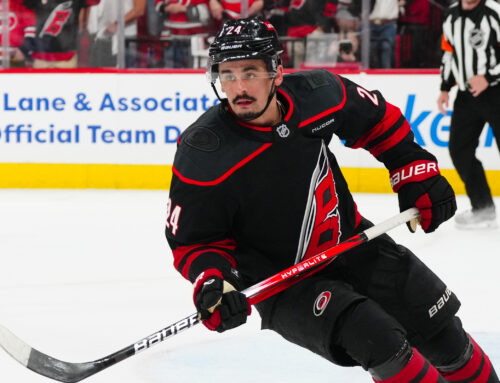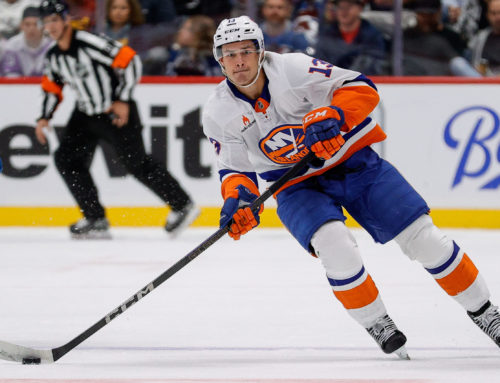
In this week’s installment of Eastern Edge, we finish our review of goalie performance from the Atlantic division during the 2018-2019 season. In case you’ve forgotten, here are a couple of stat definitions to keep in mind as we go:
Goals Saved Above Average (GSAA) from Hockey Reference: the goals a goalie prevented given his save percentage and shots faced vs. the league average save percentage on the same number of shots. (Min. 4 shots faced per team game needed to qualify.)
Quality Start % from Dobber Hockey: Proportion of games with a save percentage above league average or games with fewer than 20 shots and a save percentage above .885.
Follow me on Twitter @BrennanDeSouza for the latest news around the National Hockey League and feel free to shoot me a message if there’s anything you want discussed in future articles!
|
Season |
Record |
GAA |
SV% |
Shots Against |
GSAA |
Quality Start % |
|
2016-2017 |
33-16-14 |
2.67 |
.918 |
2052 |
8.58 |
57.6 |
|
2017-2018 |
38-21-5 |
2.81 |
.918 |
2211 |
12.06 |
56.1 |
|
2018-2019 |
36-16-7 |
2.77 |
.917 |
1958 |
14.48 |
70.0 |
In his first two years with the Toronto Maple Leafs, Frederik Andersen was heavily scrutinized for his early-season struggles. In both the 2016-2017 and 2017-2018 campaign, Andersen posted a save percentage below .900 and a GAA above 3.40 in the month of October. He flipped the script last season, recording a .919 SV% and 2.56 GAA during his first month of action.
While looking through his numbers with the Leafs, I found it interesting to see that he has consistently performed better before the All-Star break than after it. In each of the past three seasons, he has posted a save percentage above .920 before the break and below .915 after the break. Perhaps the strategy in fantasy hockey leagues next season will be to draft Andersen and trade him shortly before the All-Star Break?
If you’re only looking at the average number of goals a goalie allows, or the percentage of shots he saves, you’re likely not getting the full story. ‘Goals saved above average (GSAA)’ is a useful metric that lets us know how a netminder performed in comparison to a ‘league average’ goalie. In Andersen’s case, while his save percentage and goals against average haven’t seen drastic change during his three seasons with Toronto, his GSAA has seen consistent improvement. During the 2018-2019 season, Andersen saved 14 more goals than the average goalie – indicating he had one of the best seasons of his career.
The Maple Leafs take a lot of flak for having a shoddy defensive core. While the team does give up a lot of shots (33.1 shots against per game last season – eighth most in the league), it’s not like Andersen was hung out to dry every game. Only about 20% (400/1958) of the shots Andersen faced last season were of the high danger variety – meaning they came from close to the front of the net. The Predators have one of the league’s best defensive units and 24% (373/1551) of the shots Pekka Rinne faced were highly dangerous. The Islanders were credited for their excellent defensive play this season yet Robin Lehner (21% – 277/1292) and Thomas Greiss (23% – 277/1185) still faced a greater portion of high-danger shots. While these comparisons aren’t exactly perfect, I’m trying to dispel the narrative that the Leafs are an awful defensive team. So, don’t let that myth discourage you from taking a chance on Freddy in your fantasy leagues. You can check out the stats for yourself over at Corsica Hockey.
|
Season |
Record |
GAA |
SV% |
Shots Against |
GSAA |
Quality Start % |
|
2016-2017 |
17-21-9 |
3.03 |
.900 |
1417 |
-11.21 |
40.8 |
|
2017-2018 |
14-13-6 |
3.03 |
.902 |
1080 |
-9.50 |
28.2 |
|
2018-2019 |
23-14-3 |
2.39 |
.914 |
1104 |
4.51 |
57.5 |
Projecting the value of goaltenders might be one of the hardest things to do as a fantasy hockey manager. Maybe an injury significantly alters how a team plays in front of their netminder, or maybe a coaching change comes with new defensive strategies. In many ways, a goaltender falls victim to how the team in front of him plays. With the unpredictability that surrounds the position, we tend to favour goalies that have a track record for solid play. Names like Andrei Vasilevskiy, Carey Price, Sergei Bobrovsky, Braden Holtby, Tuukka Rask, Pekka Rinne and Marc-Andre Fleury come to mind when we think of consistent performers – but even they have fallen victim to a season of struggle in the past. So what happens when a goalie’s performance has been subpar in the past, but above-average in the most recent season? Do we allow recency bias to cloud our future projections? Well in the case of Petr Mrazek, no – but the situation is more complicated than that.
I’m hesitant to endorse Petr Mrazek as a solid fantasy hockey option because we haven’t seen him perform well for a long period of time. Sure, he was good as the Red Wings’ starter during the 2015-2016 season, posting a 2.33 GAA and .921 SV% through 54 games. However, his play beyond that one season has been pretty underwhelming. I know you’re tempted to look at his performance last season as an indicator that he’s going to play well going forward, but he only played 40 games. While it might seem that the Hurricanes boast the best defensive core that Mrazek has ever played behind, the shot volume and quality he faced during his one season in Carolina wasn’t drastically different from what he faced during his time in Detroit and short stint in Philly. If he’s given a greater workload next year and maintains his above-average play, maybe he becomes a solid fantasy hockey option going forward, but I think this is a situation we must continue to monitor.
|
Season |
Record |
GAA |
SV% |
Shots Against |
GSAA |
Quality Start % |
|
2016-2017 |
17-15-6 |
2.68 |
.915 |
1217 |
1.32 |
50.0 |
|
2017-2018 |
18-11-2 |
2.47 |
.929 |
1143 |
19.32 |
57.1 |
|
2018-2019 |
18-16-5 |
3.12 |
.899 |
1205 |
-13.39 |
44.2 |
*Seven seasons of + gsaa before this one
I’m going to keep this one short and sweet because there’s a decent chance that Bobby Lu retires this offseason – so he might not have any impact on your fantasy hockey league next year. Having recently celebrated his 40th birthday, it would seem that Luongo is no longer in a position to be a team’s starting goalie. He’s had an outstanding 20-season career, but it became evident last season that injuries and age are starting to get the better of him. With that being said, I’m hesitant to bet against Luongo because he’s just one year removed from a stellar .929 SV% and 2.47 GAA. Last season marked the first time in 20 years that he finished a season with a save percentage below .900 and he fell short by just one percentage point (.899). In fact, he’s only fallen short of a .910 SV% three times in his career and had posted a save percentage of .915 or greater for six straight years prior to the 2018-2019 campaign.
What I’m saying is, this guy has been so good for so long, it’s hard to write him off after just one bad season. While his workload has been reduced in recent years, and he will probably act as the back-up if he plays next season, I genuinely believe he’s still capable of putting up solid numbers. If you already have two reliable goalies on your fantasy roster and you’re looking for a third to round out your team, you could do a lot worse than Bobby Lu.
|
Season |
Record |
GAA |
SV% |
Shots Against |
GSAA |
Quality Start % |
|
2016-2017 |
10-11-1 |
2.10 |
.927 |
675 |
9.42 |
57.7 |
|
2017-2018 |
22-27-9 |
2.85 |
.910 |
1770 |
-4.65 |
46.7 |
|
2018-2019 |
23-22-5 |
3.07 |
.909 |
1709 |
-1.96 |
54.5 |
Jimmy Howard was fantastic in the first quarter of the 2018-2019 season as he posted a .922 SV% and 2.64 GAA. However, as you would expect from an older goalie behind a subpar team, his numbers declined as the season progressed. All things considered, Howard’s .909 SV% on the season was actually pretty respectable considering the lacklustre defense he plays behind. 24% (418/1708) of the shots Howard faced were of the high-danger variety – so he was facing quite a few shots from the slot.
Unfortunately for Howard, the team’s defensive core isn’t likely to be much better next season, so it’s hard to expect much from the 34-year-old netminder going forward. With that being said, one thing he does have going for him is a lack of competition. Jonathan Bernier wasn’t very good in his first season as a Red Wing last year – he posted a .904 SV% and 3.16 GAA through 35 games. Beyond Bernier, Detroit doesn’t really have anyone in the system that’s ready to make the jump to the NHL, so Howard should be getting the majority of the starts as long as he stays healthy.
While expectations aren’t high for the Red Wings next season, the team’s forwards are certainly capable of tallying a few more wins than we might expect. Anthony Mantha is coming off an impressive performance at the 2019 IIHF World Championship – where he tallied 14 points in nine games. Dylan Larkin has always been an underrated superstar in my eyes – he put up 73 points in 76 games last year without much help. Andreas Athanasiou and Tyler Bertuzzi both impressed me with their offensive output last season and Filip Zadina could be ready to make an impact at the NHL-level. All in all, Jimmy Howard could contribute more wins and a better save percentage to your fantasy roster than you might expect.





 ANA
ANA CAR
CAR TOR
TOR VAN
VAN PIT
PIT MIN
MIN S.J
S.J OTT
OTT
